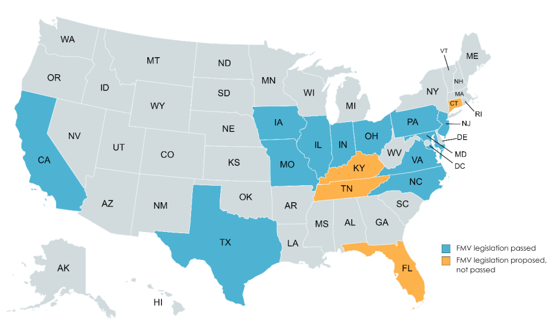For many communities, repairing and updating failing water and wastewater infrastructure has been a topic. Several efforts are underway to provide funding for water and wastewater treatment facilities. However, many smaller facilities may not have the expertise or personnel to make the necessary changes required to meet the standards that increasingly require more capital.
In September of 2021, Kathryn Kline, a Senior Research Associate at the National Regulatory Research Institute (NRRI), released “A Review of State Fair Market Value Acquisitions Policies for Water and Wastewater Systems.” This review dove into the current state of small, distressed, and municipal water and wastewater systems and evaluated how Fair Market Value acquisition may benefit all parties involved.
What is Fair Market Value acquisition (FMV)?
Traditionally, the value for a system being acquired is calculated using the original cost less depreciation standard, which takes the in-service capital cost of assets and subtracts accrued depreciation. This puts distressed, municipal, and small water systems at a disadvantage. The Fair Market Value (FMV) acquisition method creates a rate mechanism used to encourage the acquisition of these disadvantaged systems by larger utilities. FMV allows the fair market value of the acquisition to be included in the rate base, which often results in better incentives for the collaboration.
What are the pros and cons of FMV?
An FMV assessment aims to encourage larger utilities to purchase distressed, municipal, or smaller water systems. Still, it may be difficult to see how the larger utilities benefit. It is easy to see how it benefits these distressed/municipal/small water systems by providing funding and expertise to get the systems up to code to provide proper services to customers. Although acquiring a struggling system requires capital to get a system to meet standards, FMV increases the allowable rate base, which provides more incentive to help make the acquisition beneficial for both parties.
What states currently use FMV?
As of September 2021, twelve states have passed FMV acquisition regulations: California, Iowa, Illinois, Indiana, Maryland, Missouri, New Jersey, North Carolina, Ohio, Pennsylvania, Texas, and Virginia. Each state’s rules vary but commonly ensure that the policy is targeted towards struggling municipal water and wastewater systems. California implemented FMV policies before most other states. The state passed the Public Water System Investment and Consolidation Act of 1997, which required the Public Utilities Commission to use the standard of FMV to establish rate base values. The state passed additional legislation in 2017 that increased consumer protection for clean and affordable water.
Will New York implement FMV policies?
There have been sixteen states that have proposed to adopt the FMV acquisition rate mechanisms, with twelve states passing it into legislation. New York has neither adopted nor proposed any FMV policies and is currently unlikely to do so. Since 2018, New York state has budgeted $4 billion for clean water infrastructure and fulfills the Governor’s $5 billion clean water commitment. Additionally, the passing of the Bipartisan Infrastructure Bill would provide further funding for clean water infrastructure. With the large sum of funds available for needy small water system owner/operators, the need for larger utility acquisition is unnecessary. However, there may be a benefit for future implementation of FMV policies to consolidate water system management and provide operational expertise.
If you need additional assistance understanding the new appraisal methodology and its advantages to your system, please contact Walden by calling 516-701-1681. For more information about Walden’s utility valuation services, click here.

